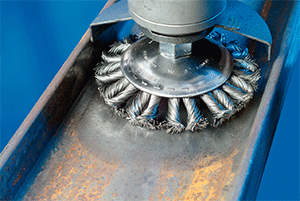

The World Steel Association has lowered its forecast for steel demand for 2022, anticipating that demand will contract by 2,3% this year as the global economy struggles with macroeconomic headwinds.
South Africa’s steel industry has been under pressure for years as a result of a prolonged period of economic decline. Even prior to the COVID-19 pandemic, low domestic demand and a depressed global market were negatively impacting the local steel sector, leading to unprecedented job losses. The iron and steel industry was one of the main pillars of the local economy until as recently as two decades ago, but the industry’s contribution to GDP has fallen significantly since the 2009 financial crisis, primarily as a result of cheaper imports, challenging trading conditions, high tariffs, and insufficient local infrastructure investment.
The Steel and Engineering Industries Federation of Southern Africa (SEIFSA) estimates that, between 2007 and the second quarter of 2019, the metals and engineering industry shed around 49 000 jobs, of which 38 000 were in the metals sector. And since 2015, around 1000 companies were liquidated and more than 300 companies put into business rescue when duties were imposed. This state of affairs was exacerbated by the COVID-19 pandemic and lockdown restrictions, which limited economic activity.
In 2021 a steel industry ‘master plan’ was signed, with the aim of revitalising South Africa’s struggling downstream steel industry. While some have welcomed the master plan, others argue that it prevents the industry from accessing cost-effective input materials, which in turns makes it uncompetitive – one of its key failings.
There is no question that saving the strategically important steel industry has merit. A competitive downstream steel industry would have a number of multiplier benefits for the economy. Any strategies to revitalise the industry must prioritise and ensure the industry’s overall long-term competitiveness. This inevitably requires scrapping import duties on steel that will be beneficiated locally to ensure a more stable and competitive local market.
Given a subdued local economy and the likelihood that any infrastructure rollout will be limited, local steel businesses need to be pursuing export opportunities if they hope to grow. Local steel companies argue that if they are to be sustainable, then the only way they can create a strong export market for locally produced steel products is if they are able to procure raw materials at a competitive price from the international market.
Encouragingly, the World Steel Association expects that global demand for steel will start recovering in 2023, growing by an expected 1%. South Africa’s steel sector needs to ensure that it is competitively positioned if it hopes to benefit from this upturn.
To ensure its competitiveness, the industry also needs to address energy constraints, efficiency improvement, human capital and skills development. As far as the latter is concerned, PFERD South Africa is coming to the party. As a specialist in the development, production, support and distribution of premium tool solutions, the company has established a training academy that provides free training to operators of abrasive equipment.
The PFERD Academy addresses challenges such as operator fatigue, incorrect tool handling, material cross-contamination, consumable and machine incompatibility, and non-adherence to labelled guidelines. The company believes this training plays an important role in optimising operational efficiency because companies then benefit from reduced equipment bills, as less frequent replacement is required. Safe work practices reduce injuries, leading to reduced operator downtime, and ultimately increased productivity.

© Technews Publishing (Pty) Ltd | All Rights Reserved